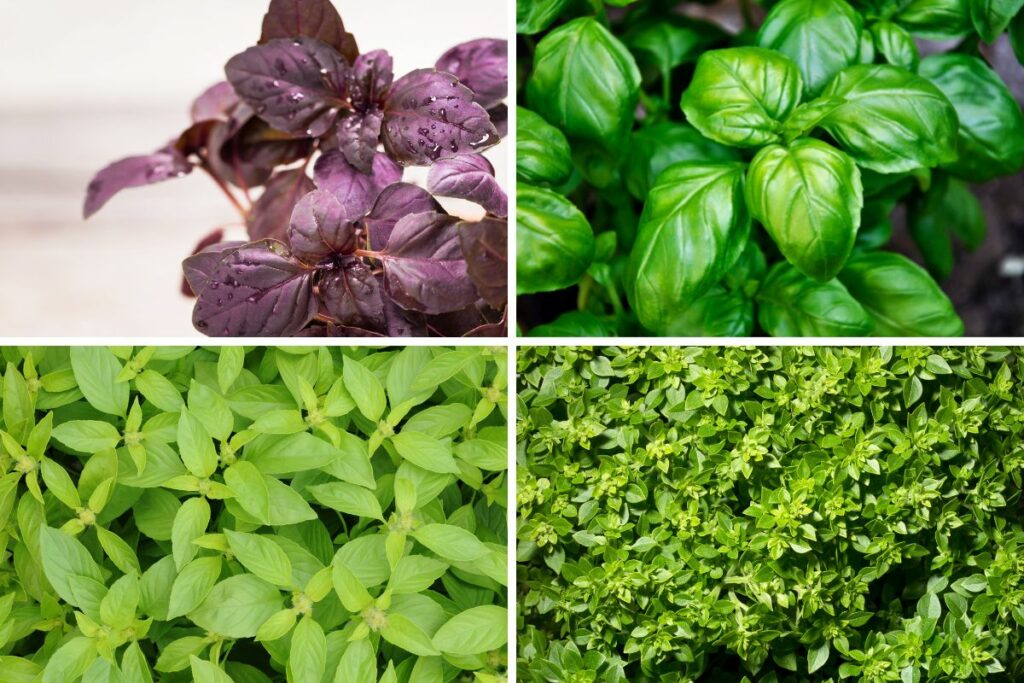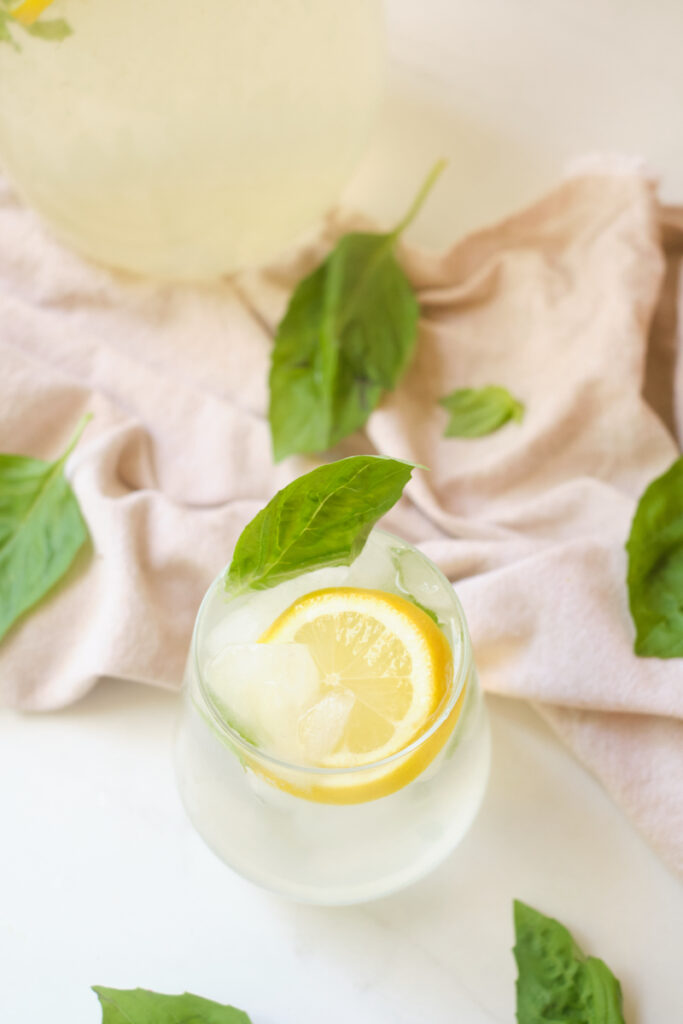As an Amazon Associate I earn from qualifying purchases. This website also participates in other affiliate programs and may earn commissions if you shop through the links used on this website.
(This article was originally published on July 25, 2022 and was last updated on July 26, 2022)
Basil is considered the king of herbs. And for a good reason. The aroma, flavor, and range of uses are unsurpassed. But there is far more to basil than meets the eye. Learn more about your favorite herb with this collection of 50+ interesting basil facts.
During the summer, you can find prominent basil displays at your local farmers market or the produce department at any grocery store. A symbol of delicious summertime treats, sweet basil is well-known and regularly appears on dinner tables.
But, there is far more to this flavorful herb than meets the eye. In fact, you will find that an entire world of basil stretches well beyond pesto, pasta sauce, and Caprese.
You can spend a lifetime learning about basil – from its fascinating history to its many uses. Or how to cultivate countless unique varieties. With so much to uncover and explore, where do you start?

To help you begin your journey of discovery, we wanted to offer some inspiration. Explore the 50 interesting facts about basil below and see where the aromatic winds take you.
Facts About Basil (The Basics)
- There are at least 100 known varieties of basil.
- Cultivated for roughly 5000 years, the earliest written reference to basil dates back to before 206 B.C.E.
- Most varieties grow between 1-3 feet high, but some can reach up to an incredible 10 feet tall.
- Basil is a member of the mint family (Lamiaceae).
- The origin of the name “basil” is a little mysterious. It derives from either basilikon or basilicum, which are Latin words. Basilikon means king or royalty, and basilicum refers to the basilisk, a mythical serpent.
- Some delicious basil varieties to try are Genovese (sweet) basil, purple basil, cinnamon basil, lemon basil, lettuce basil, licorice basil, holy basil, Thai basil, lime basil, Greek basil, and African blue basil.
The History of Basil
- Legend has it that Alexander the Great was so smitten with basil, he brought it home to Greece after one of his conquests for the ancient Greeks to enjoy.
- Basil spread rapidly via the spice trade and became a prized herb in every country it reached.
- In the Middle Ages, basil was a treatment for scorpion stings. But there was also a belief that smelling basil would result in scorpions growing in your brain.
- Basil played a role in the embalming process in Ancient Egypt, finding its way into the tombs of pharaohs.
- It features prominently in classic literature, including poetry by John Keats and The Decameron by Giovanni Boccaccio.
- It is known as a symbol of love for multiple cultures.
- In modern times, basil has even been to space! 10,000,000 cinnamon basil seeds went to space with NASA in 2007.
Basil and Religion
- Basil takes center stage during the St. Basil feast day in Greece on January 1.
- Holy basil (Tulsi) is considered sacred in India and is associated with Tulasi and Vishnu.
- Legend has it that basil grew next to the site of Christ’s crucifixion and led St. Helena to the location when she was on pilgrimage.
- Yet another legend says basil grew next to Christ’s tomb after the resurrection, symbolizing new life.
- In the Greek Orthodox Church, priests use bundles of basil to sprinkle holy water and ward off evil.
- In Judaism, bunches of basil are part of fasting rituals. The belief is that fresh basil revives energy and increases strength while fasting.
Basil Plants as Medicine
- It is a well-known and beloved herb in traditional herbalism, including Western Herbalism, Chinese Medicine, and Ayurveda.
- Hippocrates and Pliny the Elder mention medicinal uses for basil in their writings.
- Basil is rich in basil essential oil which can reduce inflammation and has mild pain-relieving properties.
- All basil varieties are nutrient-rich, boasting Vitamins A, C, K, calcium, potassium, and other minerals.
- It contains high levels of flavonoids and other antioxidant compounds, both of which help protect against cancer.
- Tulsi basil is an adaptogenic herb – a class of herbs that help the body cope better with stress and assist with recovery.
- Basil also has antimicrobial, cardioprotective, and antiseptic anti inflammatory properties.
- It plays a role in aiding the following problems: respiratory illness, headaches, and digestive trouble / stomach cramps (although, it might cause digestive upset in cats and dogs).
- In all herbal traditions, it is a remedy for boosting moods, helping fight anxiety, and treating poor concentration.
Growing Fresh Basil
- Basil is a natural insect repellent, which makes it an ideal companion plant. It regularly gets planted next to tomatoes for its pest deterrent properties and because they require similar care.
- A frost-sensitive annual, basil loves the warmth of the summer months and thrives when daytime temperatures are consistently at least 70 F. Once first frost hits, it won’t survive outdoors.
- Pinch off the flowers when you first notice them to encourage the growth of large, delicious leaves.
- In some regions, basil can be grown as a perennial.
- You can propagate basil from either cuttings or grow from seeds.
- The ideal time to harvest basil is in the early morning since this is the time of day when the essential oil content is at its highest level.
- You can grow your basil year round in containers, windowsill and kitchen counter gardens, and hydroponic gardens. When growing basil indoors, provide your basil with plenty of light and full sun (6-8 hours per day) and high-quality fertilizer to keep your plants happy.
- When grown outdoors, basil thrives in nutrient-rich, well-draining, and moist soil.
Cooking With Basil
- Basil flowers and flower buds are edible and can get added to nearly every recipe that calls for basil – either with the fresh leaves or instead of them.
- Basil is a great option to use in both savory and spicy dishes.
- It is a perfect addition to sweet treats such as ice cream, shortbread cookies, and sorbet.
- Basil pairs surprisingly well with a wide variety of fruit. Some delicious fruit and basil pairings worth a try feature stone fruit, berries, and citrus.
- You can take your salad dressing to the next level when you infuse basil in olive oil or vinegar.
- “Spice” up your salt by infusing it with basil. All you need to do is mix some dried basil into sea salt to create a taste delight.
- Feel free to eat basil in both cooked and raw forms.
- You can freeze basil to preserve it longer and quickly add the flavor of summer to meals during the coldest months. To keep your basil from turning black, this is best done in the form of pesto or blended into olive oil that you can freeze in ice cube trays.
- Store fresh basil leaves with their stems immersed in a glass jar of water after harvesting. Just be sure to keep it out of the sunlight.
- Beyond Italian cuisine, basil also features prominently in dishes across Southeast Asia.
Basil as a Beverage

- Create incredibly flavorful and refreshing summertime drinks by incorporating basil.
- Basil can be added to the second fermentation stage of kombucha, either by itself or with fruit or spices, for a refreshing and nutrition-packed drink.
- Tulsi basil is a well-known basil tea you can enjoy throughout the day, even right before bedtime, to help you relax.
- Add basil to your next cocktail for a unique flavor profile and stunning aesthetic.
- Basil is awesome in lemonade.
- You can infuse basil into wine.
- Turn basil into herbal ice cubes that you can add to tap water, sparkling water, or ice tea. Fill your ice cube tray halfway with water and partially freeze it. Add fresh basil leaves, fill the remainder of the spaces with water, and freeze fully.
- You can even drink basil seeds, and basil seed drinks are popular in India and Thailand.
What Basil Facts Do You Know?
These basil facts are just a brief glimpse into the incredible world of basil. Use them as a starting point to begin your own exploration. Whether you are a history buff, a gardener, or love to experiment in the kitchen, you will find endless ways to incorporate basil into your life. We encourage you to dive into more interesting facts, find out how to have a successful harvest, or discover new and delectable recipes to try.
Jennifer is a writer, Nutritionist, and Herbalist who loves all things food. She grows basil alongside other herbs and edible flowers in her garden. Herbs also hold a prominent space in her aerogarden. She enjoys experimenting in the kitchen, finding fun and unique ways to incorporate herbs into daily life. Jennifer is passionate about helping others discover the joy of quality food. And she loves to bring her two kids along on endless food adventures!

